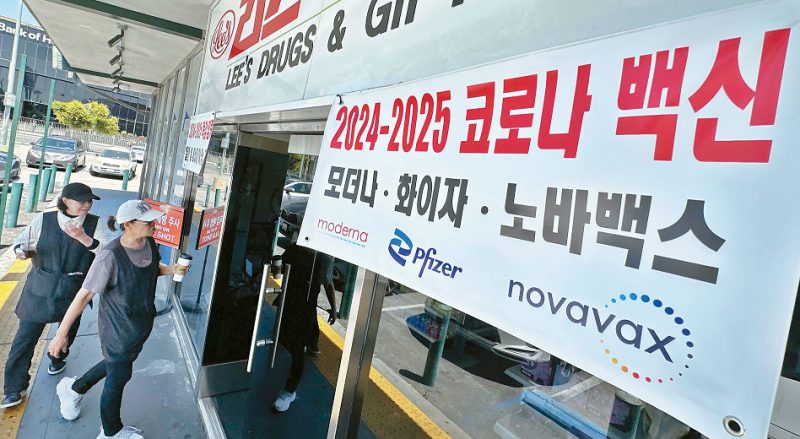The recent surge in COVID-19 infections in California, including Los Angeles County, has led to a shortage of medications at pharmacies in Los Angeles Koreatown.
According to the federal Centers for Disease Control and Prevention (CDC), the recent surge in COVID-19 cases has been driven by the rapid spread of FLiRT, a sub-variant of Omicron.
On August 2, authorities reported that COVID-19 levels in California wastewater this summer surpassed the highest summer levels in the past two years. The levels have been “high” or “very high” for eight consecutive weeks.

Los Angeles County averaged 452 new cases per day as of the last week of July, up from 413 the previous week.
This number is reportedly undercounted because it only includes tests performed at healthcare facilities. The number of cases in Koreatown is also on the rise.
Mark Lee, director of public relations at Mission City Community Clinic, which tests and prescribes medication for the disease, said, “We’ve seen an increase in patients since three weeks ago. The problem is that it is difficult to find treatment in Koreatown as the number of patients is increasing at an unexpectedly rapid pace.”
The oral medication Paxlovid is typically prescribed for COVID-19 infection. However, due to the sudden high demand, pharmacies in Koreatown have been unable to stock the drug, forcing patients to travel to other local pharmacies, such as CVS in downtown Los Angeles, the clinic said.
“Paxlovid is only effective if you take it as soon as you have symptoms, and if you wait too long to find it, it won’t be as effective later on,” Lee said.
Pharmacies in Koreatown are also saying that they’ve seen a surge in infections and demand for treatment. “The number of people infected has increased significantly in the past few months,” said a pharmacy on Vermont Avenue. “There are more people looking for medication, and right now we don’t have a lot.”
The shortage has only recently been improving. “The number of people seeking prescription drugs has increased with the increase in the number of COVID-19 patients,” Lee’s Discount Drug said, adding, “Not long ago, patients had to wait a long time to get their medications, and sometimes they couldn’t get them at all. We have medications available now, and they’re not running too short. We’re also not seeing the same level of severity of patients who are at risk of dying without medications as we have in the past.”
Los Angeles County saw an average of 389 COVID-19 hospitalizations per day as of the last week of July, twice as many as a month earlier.
Experts say that while the new strain of the virus is more infectious, there is no evidence that it is more likely to result in hospitalization.
However, there have been reports of severe symptoms of infection with the latest variant, including extreme pain from a sore throat and a cough that can be choking.
According to professionals, it may have been years since the last infection or vaccination, which is why symptoms can feel more intense.
“We’re starting to see an increase in cases of severe infections as people’s remaining immunity has weakened considerably, and we’re seeing new strains that can overcome it,” said Elizabeth Hudson, Regional Chief of Infectious Disease for Southern California Kaiser Permanente Medical Group.
BY SUAH JANG, HOONSIK WOO [jang.suah@koreadaily.com]




